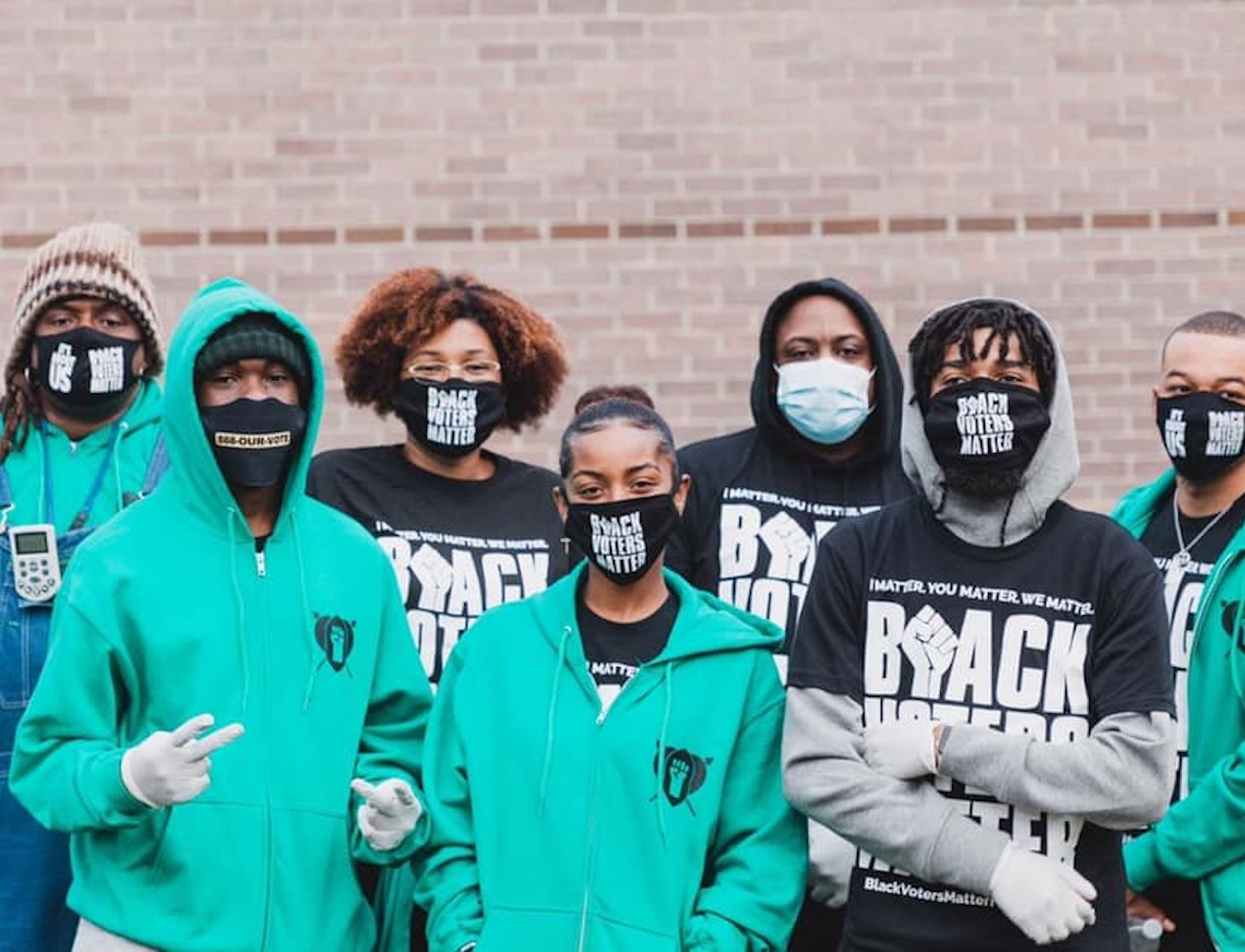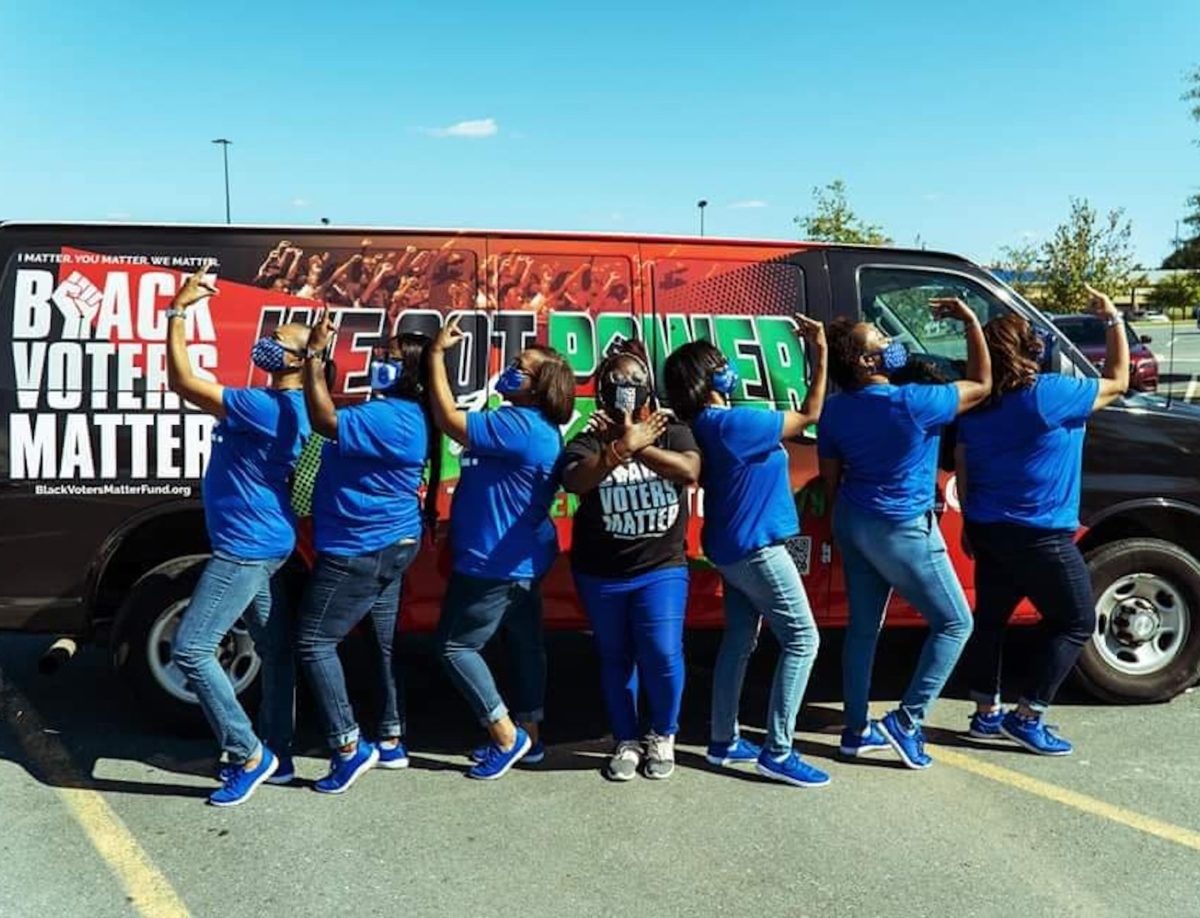Black Voters Matter Co-Founder Says Voting Enthusiasm Is Strong Despite Rampant Suppression
The group is seeing real challenges posed by the pandemic, voter suppression tactics, and threats of intimidation.

This is the year that Black Voters Matter had been waiting for—a critical presidential election is approaching amid an ongoing reckoning about systemic racism.
Started in 2017 to help elect Doug Jones to the U.S. Senate in Alabama’s special election, the group partners with grassroots organizations to expand Black voter engagement across the country.
In the weeks before the 2018 midterm election, Black Voters Matter gained national attention as its charter bus crossed the South, doing voter education, registration, and outreach. This year, with the COVID-19 pandemic halting so many get-out-the-vote activities, Black Voters Matter has had to adapt.
The Appeal spoke to co-founder Cliff Albright about how the pandemic has affected voting in Black communities and about threats of voter suppression. This interview has been edited for length and clarity.
What are you focused on with just a few weeks left?
We’re prioritizing trying to get as many people as possible to early vote. We’re doing a whole campaign around voting by mail where folks can. We’re suing states to try to get them to more effectively expand access to vote by mail where they’re trying to restrict it. We’re doing our bus tour, we’re doing caravans in 12 states to get people excited and to give out QR codes so people can register to vote or get their mail-in ballot. We’ll be in Texas, where the governor restricted counties to just one drop-off location. One of the stops on our caravan will be that one drop box. We’re partnering with a couple organizations on a whole early vote campaign. In Alabama, where they don’t have an early vote process but they do have absentee by mail and you can do absentee in-person, we’re doing an early vote campaign there. Because of our lawsuit and as part of the settlement, some of the counties have expanded their hours and added a couple of weekends of Saturday voting, so we’re doing a whole campaign to get people to take advantage of Saturday absentee in-person voting.
We were in South Carolina the other day, where we had a caravan with at least 60 cars. It was just a huge line of vehicles. We’re using that strategy in lieu of door-knocking to do things where we can still have personal contact, generating excitement in neighborhoods in a way that’s safer than going door to door but more personal than virtual.
In what ways have you seen the pandemic make it harder for Black voters in the South to cast ballots?
We all know and we’ve known for a few months that Black communities are being hit hardest by the pandemic. Right around the time that some of that data started coming out, you started seeing a shift in the White House and governors saying, “Let’s reopen everything. Oh, it’s the Black folks that are getting killed? Let’s just go back to normal.” So one impact is just the impact of the pandemic itself.
The other impact is on the voting process and the shift to people having to vote by mail, in order to stay safe. It means that you’re dealing with all those requirements—the signature requirement; in Alabama, you’ve got to be able to copy your photo ID and include it with your mail-in ballot [application]. We’re seeing a disproportionate impact in terms of the health issues and we’re seeing that compounded with a disproportionate impact with the suppression issues related to vote by mail, and then we’re seeing other disproportionate impact in terms of how we did our research and how most of our community partners aren’t able to do traditional door work or traditional church work. All of that is made more difficult and we have to rely on virtual spaces that we’re not used to or are more expensive than the traditional ways.
You look at all those impacts—the health impact, the suppression impacts that have been reinforced, the outreach efforts that have been impacted—and what you’re presented with is a real challenge. The good news is that in spite of all of that, and I think ultimately this should be the story of this cycle, you’re seeing remarkable turnout in our communities. In every city that we’ve gone to in the primaries as well as what we’re seeing already right now for the November election, we’re seeing extremely high numbers of ballots requested and ballots returned and people finding ways to overcome these obstacles and people finding creative ways to get the word out.

It sounds like you are seeing so much excitement and enthusiasm for voting. Are you concerned that Trump’s calls for poll watchers might intimidate or suppress turnout?
We have to be concerned about it and take it seriously. When he tells them to “stand by,” he’s not playing. We’ve seen him sending unidentified so-called federal agents to places like Portland [Oregon] and rounding people up under the guise of protecting buildings. We have to take it seriously, but we still have to do what we do, which is be vigilant and have an extension of the voter protection that we do every election cycle. We just ramped up and expanded our ability to engage in election protection and we work with our legal partners, including the NAACP Legal Defense and Educational Fund, Advancement Project, Lawyers’ Committee for Civil Rights Under Law, ACLU. We have to be concerned but we don’t let it stop us. If they ramp up their intimidation and suppression tactics, we have to ramp up our election protection, and that’s what we’re doing.
What states or jurisdictions are you watching for potential issues?
We’re listening to the orange man and what’s on his mind. We know that they’re going to be doing some intimidation and other suppression in Pennsylvania, probably targeting Philadelphia. We know what they did in 2016 in Michigan and they’ll be doing that all over again. Now that Cleveland is back to being in play, I’m sure they’re going to be doing targeting there in Ohio. In the South, really across the board for concerns. Florida, obviously. In Alabama, we’re concerned because we still feel like that Senate race is going to be competitive and they’re already doing this with the vote by mail process, to make it be a difficult process in terms of the signature requirement. We won our federal case and now they’re appealing that decision, but we recently got a decision that said those requirements should be waived, but it’s pending appeal. In South Carolina, where there’s a tight Senate race, the decision they made around their witness requirements just made it to the Supreme Court, which upheld the witness requirement, so it’s in effect and will have an impact on the election.
That’s the thing about these suppression tactics. Whether it’s the photo ID, whether it’s the vote by mail with witnesses, [having only] one polling place, litigating against drop boxes—all these things compiled. They don’t have to suppress every vote, but it’s death by 1,000 cuts. Those things are real obstacles, and in a race like that South Carolina Senate race, that can be the difference. It’s just like Georgia two years ago. All of the purging and the poll closures and machine issues, that can make the difference.
All of these states that we’re in, we’re very concerned and we’re keeping an eye on all these issues.
That said, we’re seeing a lot of energy, huge turnout already. We think the energy we’ve seen already is just going to increase. Everywhere we go, every caravan, every bus stop, every video, every phone call, every text, we’re reminding people that we’ve got power. At the end of the day, in spite of all the craziness, we’ve got power and we have the ability to control the outcome of this election. It’s like we always say: “When we work together, we win.”
